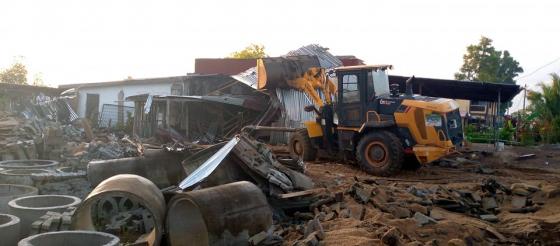Swamp Dwellers Suffer EPA’s Wrath

A bulldozer demolishes illegal structures along SKD Boulevard on the morning of Saturday, October 24.
-- As Agency carries out massive demolition of illegal structures along the Police Academy-SKD Boulevard Intersection
Residents and business people within the Police Academy Road intersection with the Samuel Doe Boulevard in Paynesville awoke to what could be termed as a rude awakening early on the morning of October 23, as bulldozers ran through and leveled to the ground illegal structures they had erected in the area.
The massive demolition exercise was done by a team led by the Inspectorate Department at the Environmental Protection Agency (EPA) in the presence of a tact squad of police officers. Many, if not all of those affected by the demolition exercise have been involved in what the EPA termed as unsustainable and unauthorized backfilling of the wetlands; blocking of waterways; discharge of wastewater and sewage into the wetland, and watercourses.
The damaged structures, many of which are make-shift residential and commercial, were constructed in the mangrove swamp against the advice of the agency, which has been reportedly warning them for months to vacate the area.
“They have been ignoring numerous warnings from the EPA, so we thought to move here early this morning to have the area clear,” Isaiah Kamara Paye, head of Inspectorate, told newsmen, “we cannot allow these things to be happening because we will be in violations of international laws our country is a signatory to.”
The Mesurado Wetlands, which the Mangrove swamp along the SKD Boulevard is a part of, is designated as a Ramsar site under the Ramsar Convention on wetlands of international importance. EPA Deputy Executive Director, Randall M. Dobayou, said the integrity of the Mesurado Wetlands is being abused by unapproved erecting of structures contrary to the zoning regulation and environmental law of the country, the continuous degradation of the mangrove ecosystem, and the illegal dumping of garbage.
“The mangrove serves a lot of important purposes to our sustenance as a people. It serves as a filter for groundwater, a breeding ground for fishes, and it helps against flooding by absorbing the water,” Dobayou said.
According to him, there is a prohibition under both international and national laws against encroaching on wetlands and destruction of mangroves and other protected species necessary for the conservation of biological diversity. Despite strong pieces of evidence of the violation of the EPML, the EPA sought a court warrant to demolish structures erected in the wetlands.
“Though we know that those people are in blatant violation of the law, we still did not wake up and come on our own, which we are at liberty to do because the laws give us that right; but we still had to seek permission from the court to act. This means that we are working in the confines of the laws of the land,” the head of the demolition exercise said.
Many of the affected residents said that they are lawful taxpayers and as such there was no need to have their properties destroyed.
“Why are you destroying my business? I’m a taxpayer. Can’t you see here? I pay taxes to both the national government and the municipality of Paynesville. Why are you people acting so wicked to me?” a man with a Nigerian accent wailed as he displayed his business records to media practitioners.
A businessman, whose properties were destroyed, complains in frustration as he displays his business and tax records
Meanwhile, the demolition exercise encounter a brief skirmish as disgruntled residents set roadblocks on the main Boulevard that halted the flow of traffic for a few minutes. But LNP officers, who were enforcing the exercise on the road leading to the Police Academy, arrived and put the situation under control.
Meanwhile, EPA in April sued these violators at the Paynesville Magistral Court. The court later cited several persons, institutions, and businesses to appear before Stipendiary Magistrate, William G. Saygah, on Friday, 16 April for violating the country’s Protection and Management Law (EPML). Some of the businesses, individuals, and institutions cited are Zeo Wood Workshop, Samuel David, USA Auto and Travel, Konah Lewis, Bishop Alfred Grear, Tetee Gartar, and a Block Factory adjacent to Kailondo Gas Station along the SKD Boulevard in Paynesville, outside Monrovia.
Many of those cited, according to reliable sources, refused to appear despite a stern warning from Magistrate Saygah that failure to do so would have left the court with no alternative, but to have their structures demolished without notice.
“And this is what we are exactly here to do this morning,” Paye noted, “They received a mandate to adhere to the call of the court to tell the Judge who gave them the right to build in the swamp and while these structures should not be demolished.”
As the principal authority for the management of the environment and the sustainable use of its resources, the agency is empowered under section 75 of the EPML to prescribe measures for the protection of wetlands, the release concluded. The actions of those individuals to construct in the wetlands contravene Section 75 Count 2 of the Act that created the Agency.
Against this backdrop, the EPA on February 25, 2021, asked violators to remove their structures, with a grace period of 30 days, or face demolition by the government. This move preceded an earlier warning of the imposition of administrative and regulatory sanctions. This warning was contained in a ‘halt order and citation’ served to the concerned individuals.
The necessity of that move was highlighted by the agency’s Executive Director, Prof. Wilson K. Tarpeh. “This decision is necessary because the ecological integrity of the Mesurado Wetlands is being compromised by these wanton abuses of the mangrove,” he noted.
